#for maneskin fans
Text
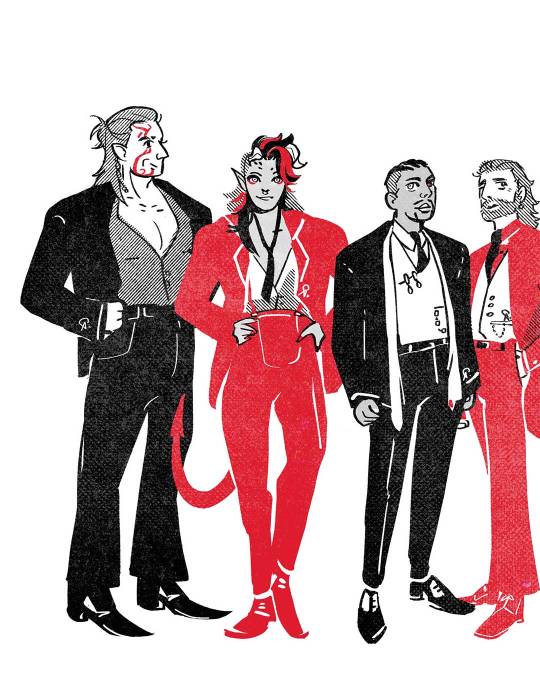
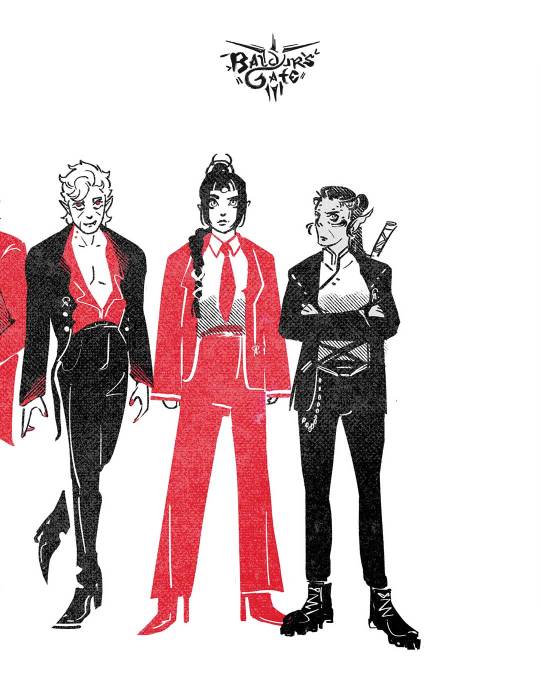
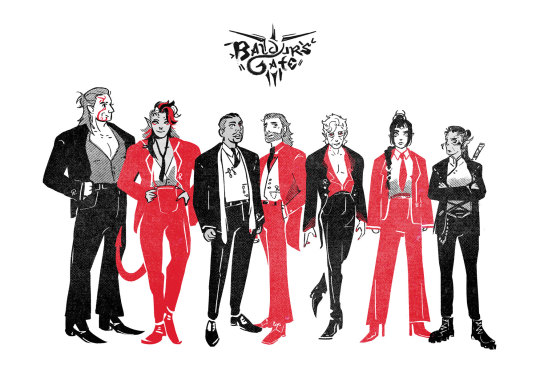
BABY SAID...
ty!
Hello, thank you for the support on my BG3 fanart. 🔥❤️
Some of you asked for individual full shots of them, so I decided to make it. There's an interesting suggestion with Shadowheart and Karlarch I might do as well...
"Can I use it as wallpaper/screen cover?"
Sure. Just don't remove my signature or modify the drawing.🤘
"Can I print it on my own?"
If possible, please consider supporting me via INPRNT. If you can't, ofc, I won't hold you, go on, print it and later drop me a coffee at ko-fi, darling! You can also share some cents via paypal. Send pics as well of your achievement. For personal use only. 🔥
"Can I print it to sell, use commercially?"
No. Unless you pay me 100kUSD.
🇧🇷"Tem print?" Sim. Só me enviar comprovante de 50$ no pix: 51648094000140 e endereço de preferência para o e-mail: niccoguedes @ gmail.com . Envio no tamanho A4 com rastreio.
#bg3 fanart#while shooting this:#halsin took off his coat after 1h#Karlach didn’t stop quiet. the photographer had to use high speed cam#Gale talked with Wyll every break#Astarion was too concerned if the camera captured him#turns out yes#and he couldn’t stop bragging about modernism#Shadowheart listened to Maneskin and is a Victoria fan now#Lae’zel wasn’t in the mood. She accepted anyway.#Small astarion agenda#Astarion being small even in heels#Pathetic little man#I love you#hazeilus#fanart#brazilian artist#bg3 astarion#tadpole gang#larian studios#baldurs gate art#i love larian#baldurs gate 3#astarion fanart#shadowheart fanart#laezel fanart#gale dekarios fanart#wyll fanart#karlach fanart#halsin fanart
396 notes
·
View notes
Text
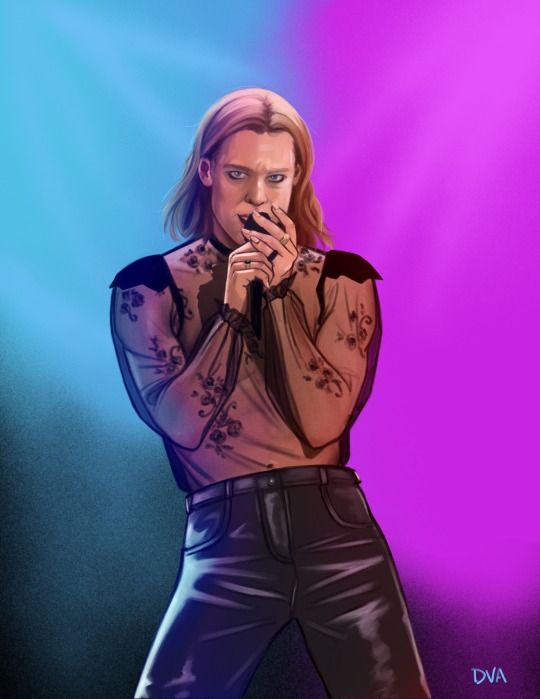
I have decided Måneskin is the vibe for the new Satan’s Night Out/The Vampire Lestat. I mean, have you seen how many 18th century inspired outfits they have? The ruffled shirts alone! Listen to “Immortale” too, LIKE?? Ugh, it’s too good.
I based this on some outfits I found on Pinterest. Also, bisexual lighting.
#interview with the vampire#lestat de lioncourt#amc iwtv#iwtv fanart#queen of the damned#queen of the damned fan art#rockstar lestat#maneskin#satans night out#iwtv#lestat iwtv#lestat
839 notes
·
View notes
Text
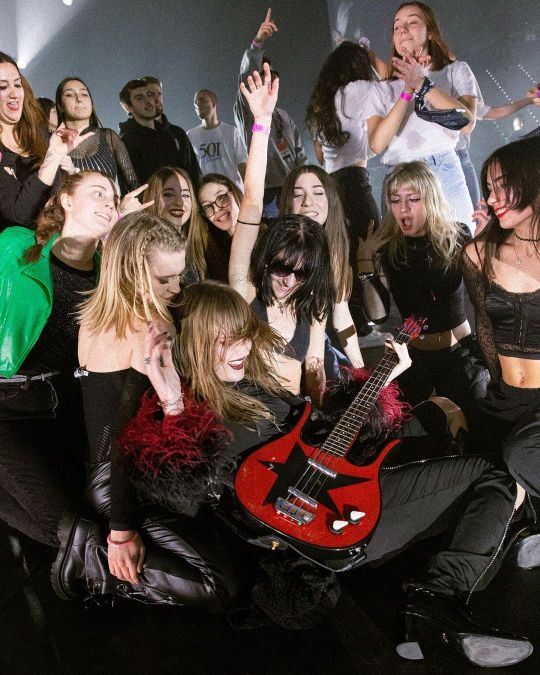
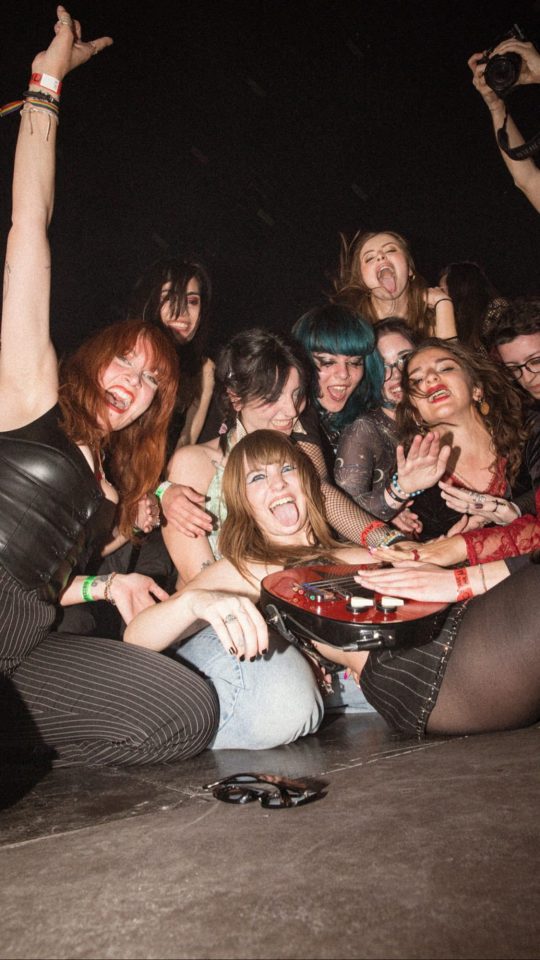
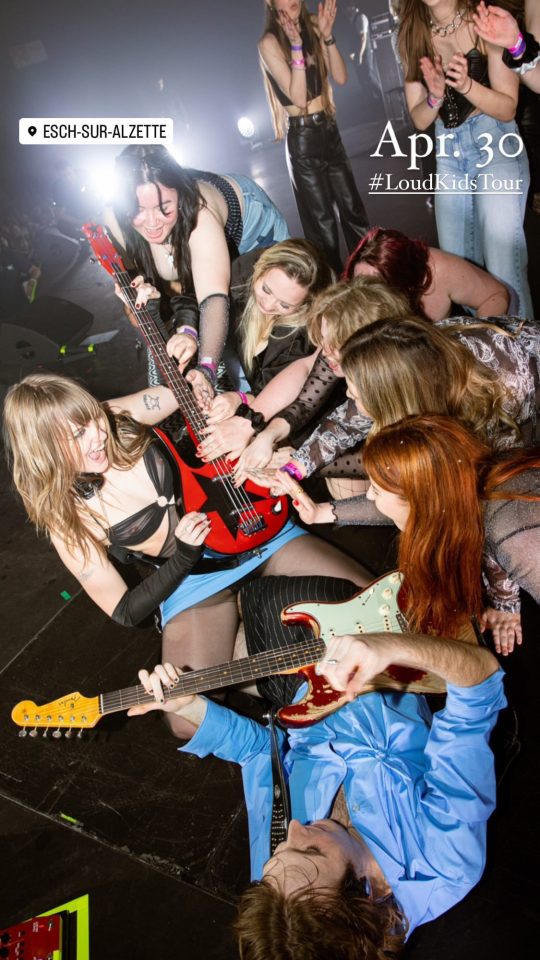
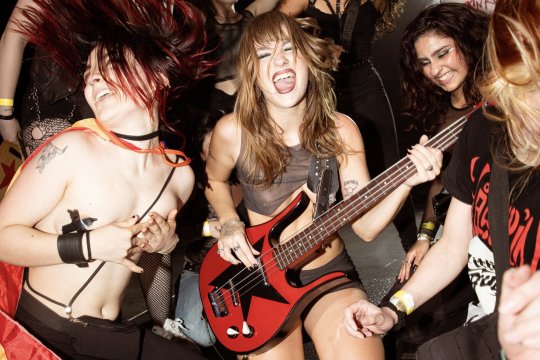
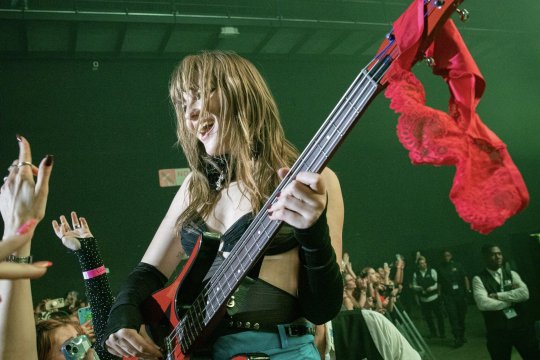
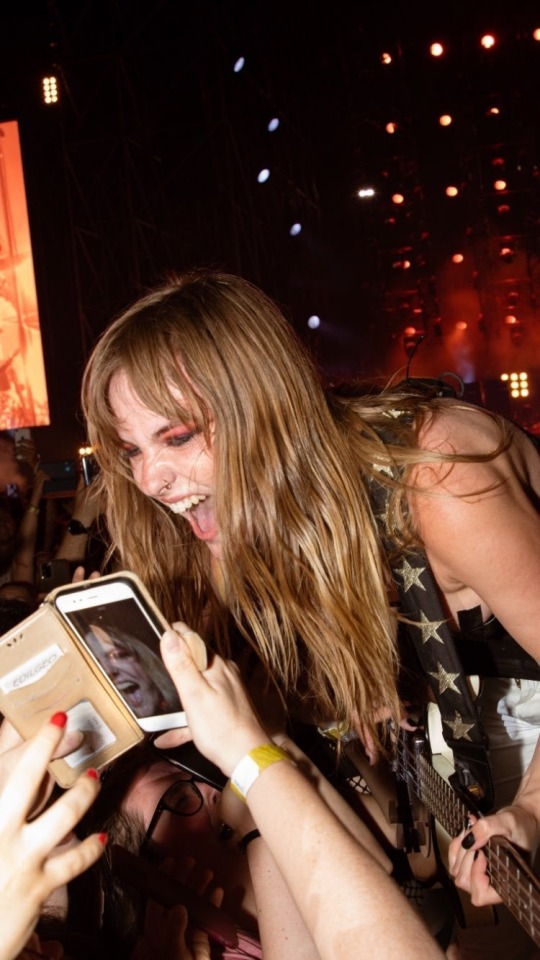
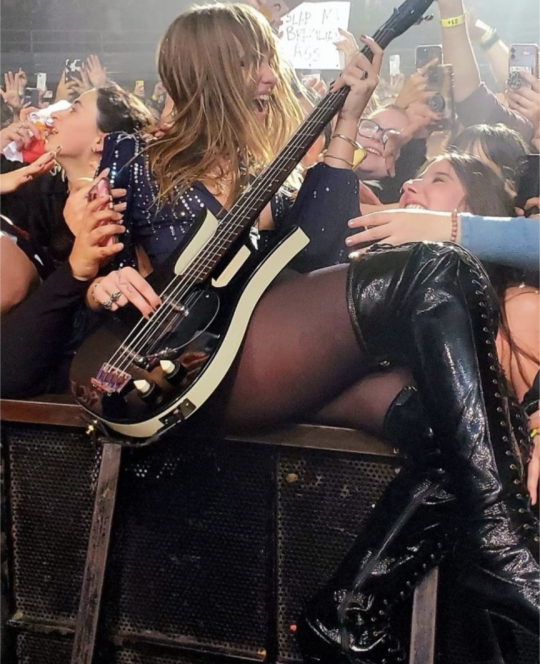
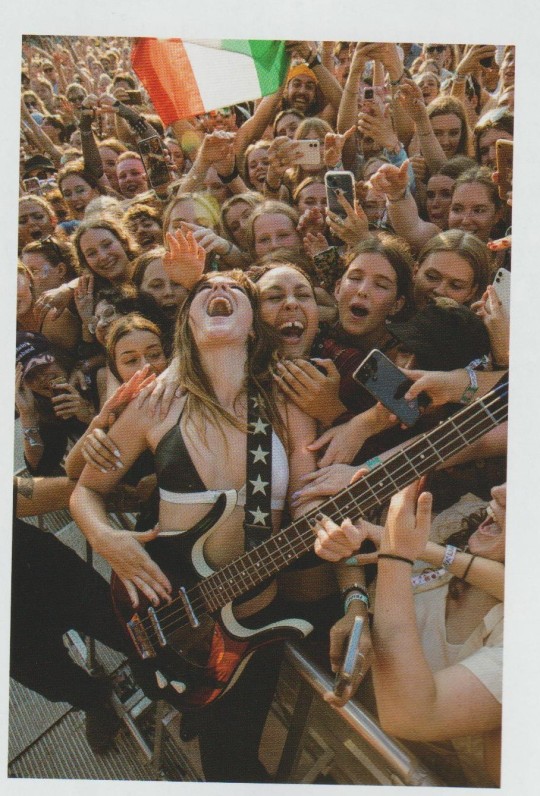
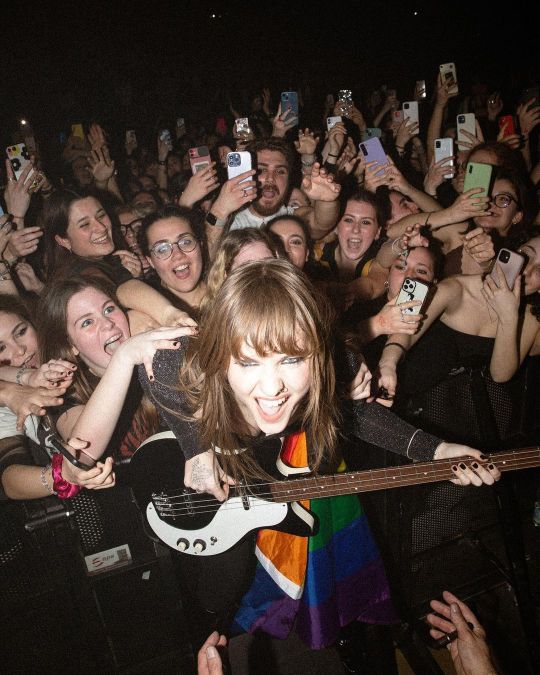
Vic with her hot chicks
#Victoria de angelis#vic de angelis#vic#she speaks#maneskin#måneskin#vics hot chicks moment#vic smiling#with fans#vics red bass#vics black bass#my posts
113 notes
·
View notes
Text
are we ready for when newer joker out fans discover bojan’s zitti e buoni cover with amaya
#joker out#bojan cvjeticanin#Bojan Cvjetićanin#amaya#maya keuc#I am a new fan too#say hi to me if you’ve followed the band since 2016#maneskin#Måneskin
154 notes
·
View notes
Text

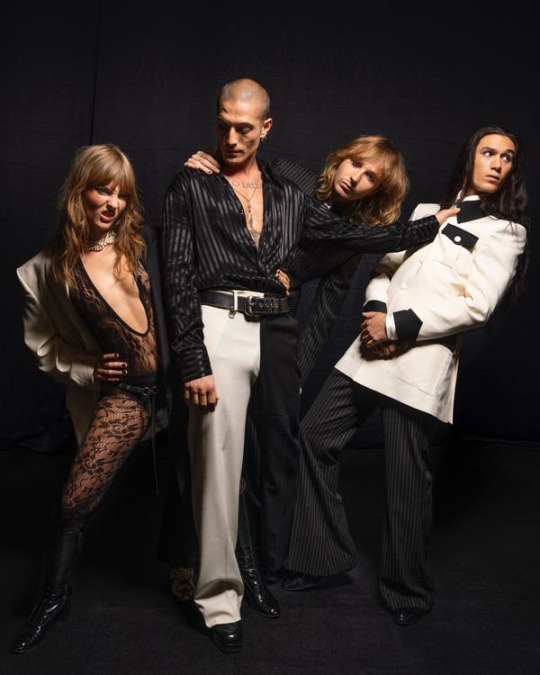
The sheer number of older and more experienced professionals involved in Måneskin introduces a tension between the rock conventions that characterize their songwriting and the fundamentally pop circumstances under which those songs are produced. They are four friends in a band, but that band is inside an enormous machine. From their perspective, though, the machine is good.
The American visitor to Rome arrives with certain preconceptions that feel like stereotypes but turn out to be basically accurate. There really are mopeds flying around everywhere, and traffic seems governed by the principle that anyone can be replaced. Breakfast is coffee and cigarettes. Despite these orthopedic and nutritional hazards, everyone is better looking — not literally everyone, of course, but statistically, as if whatever selective forces that emerge from urban density have had an extra hundred generations or so to work. And they really do talk like that, an emphatic mix of vowels, gestures and car horns known as “Italian.” To be scolded in this language by a driver who wants to park in the crosswalk is to realize that some popular ideas are actually true. Also, it is hot.
The triumphant return to Rome of Måneskin — arguably the only rock stars of their generation, and almost certainly the biggest Italian rock band of all time — coincided with a heat wave across Southern Europe. On that Tuesday in July the temperature hit 107 degrees. The Tiber looked thick, rippled in places and still in others, as if it were reducing. By Thursday morning the band’s vast management team was officially concerned that the night’s sold-out performance at the Stadio Olimpico would be delayed. When Måneskin finally took the stage around 9:30 p.m., it was still well into the 90s — which was too bad, because there would be pyro.
There was no opening act, possibly because no rock band operating at this level is within 10 years of Måneskin’s age. The guitarist Thomas Raggi played the riff to “Don’t Wanna Sleep,” the lights came up and 60,000 Italians screamed. Damiano David — the band’s singer and, at age 24, its oldest member — charged out in black flared trousers and a mesh top that bisected his torso diagonally, his heavy brow and hypersymmetrical features making him look like some futuristic nomad who hunted the fishnet mammoth. Victoria De Angelis, the bassist, wore a minidress made from strips of leather or possibly bungee cords. Raggi wore nonporous pants and a black button-down he quickly discarded, while Ethan Torchio drummed in a vest with no shirt underneath, his hair flying. For the next several minutes of alternately disciplined and frenzied noise, they sounded as if Motley Crüe had been cryogenically frozen, then revived in 2010 with Rob Thomas on vocals.
That hypothetical will appeal to some while repelling others, and which category you fall into is, with all due respect, not my business here. Rolling Stone, for its part, said that Måneskin “only manage to confirm how hard rock & roll has to work these days to be noticed,” and a viral Pitchfork review called their most recent album “absolutely terrible at every conceivable level.” But this kind of thumbs up/thumbs down criticism is pretty much vestigial now that music is free. If you want to know whether you like Måneskin — the name is Danish and pronounced MOAN-eh-skin — you can fire up the internet and add to the more than nine billion streams Sony Music claims the band has accumulated across Spotify, YouTube, et cetera. As for whether Måneskin is good, de gustibus non est disputandum, as previous Italians once said: In matters of taste, there can be no arguments.
You should know, though, that even though their music has been heard most often through phone and laptop speakers, Måneskin sounds better on a soccer field. That is what tens of thousands of fans came to the Stadio Olimpico on an eyelid-scorching Thursday to experience: the culturally-if-not-personally-familiar commodity of a stadium rock show, delivered by the unprecedented phenomenon of a stadium-level Italian rock band. The pyro — 20-foot jets of swivel-articulated flame that you could feel all the way up in the mezzanine — kicked in on “Gasoline,” a song Måneskin wrote to protest Vladimir Putin’s invasion of Ukraine. From a thrust platform in the center of the field, David poured his full emotive powers into the pre-chorus: “Standing alone on that hill/using your fuel to kill/we won’t take it standing still/watch us dance.”
The effect these words will have on President Putin is unknown. They capture something, though, about rock ’n’ roll, which has established certain conventions over the last seven decades. One of those conventions is an atmosphere of rebellion. It doesn’t have to be real — you probably don’t even want it to be — but neither can it seem too contrived, because the defining constraint of rock as a genre is that you have to feel it. The successful rock song creates in listeners the sensation of defying consensus, even if they are right in step with it.
The need to feel the rock may explain the documented problem of fans’ taste becoming frozen in whatever era was happening when they were between the ages of 15 and 25. Anyone who adolesced after Spotify, however, did not grow up with rock as an organically developing form and is likely to have experienced the whole catalog simultaneously, listening to Led Zeppelin at the same time they listened to Pixies and Franz Ferdinand — i.e. as a genre rather than as particular artists, the way my generation (I’m 46) experienced jazz. The members of Måneskin belong to this post-Spotify cohort. As the youngest and most prominent custodians of the rock tradition, their job is to sell new, guitar-driven songs of 100 to 150 beats per minute to a larger and larger audience, many of whom are young people who primarily think of such music as a historical artifact. Starting this month, Måneskin will take this business on a multivenue tour of the United States — a market where they are considerably less known — whose first stop is Madison Square Garden.
“I think the genre thing is like ... ” Torchio said to me backstage in Rome, making a gesture that conveyed translingual complexity. “We can do a metaphor: If you eat fish, meat and peanuts every day, like for years, and then you discover potatoes one day, you’ll be like: ‘Wow, potatoes! I like potatoes; potatoes are great.’ But potatoes have been there the whole time.” Rock was the potato in this metaphor, and he seemed to be saying that even though many people were just now discovering that they liked it, it had actually been around for a long time. It was a revealing analogy: The implication was that rock, like the potato, is here to stay; but what if rock is, like the potato in our age of abundance, comparatively bland and no longer anyone’s favorite?
Which rock song came first is a topic of disagreement, but one strong candidate is “Rocket 88,” recorded by Ike Turner and his Kings of Rhythym band in 1951. It’s about a car and, in its final verse, about drinking in the car. These themes capture the context in which rock ’n’ roll emerged: a period when household incomes, availability of consumer goods and the share of Americans experiencing adolescence all increased simultaneously.
Although and possibly because rock started as Black music, it found a gigantic audience of white teenagers during the so-called British Invasion of the mid-1960s (the Beatles, the Rolling Stones, the Who), which made it the dominant form of pop music for the next two decades. The stadium/progressive era (Journey, Fleetwood Mac, Foreigner) that now constitutes the bulk of classic-rock radio gave way, eventually, to punk (the Ramones, Patti Smith, Minor Threat) and then glam metal: Twisted Sister, Guns N’ Roses and various other hair-intensive bands that were obliterated by the success of Nirvana and Pearl Jam in 1991. This shift can be understood as the ultimate triumph of punk, both in its return to emotive content expressed through simpler arrangements and in its professed hostility toward the music industry itself. After 1991, suspicion of anything resembling pop became a mark of seriousness among both rock critics and fans.
It is probably not a coincidence that this period is also when rock’s cultural hegemony began to wane. As the ’90s progressed, larger and again whiter audiences embraced hip-hop, and the last song classified as “rock” to reach No. 1 on the Billboard Hot 100 was Nickelback’s “How You Remind Me” in 2001. The run of bands that became popular during the ’00s — the Strokes, the Killers, Kings of Leon — constituted rock’s last great commercial gasp, but none of their singles charted higher than No. 4. Let us say, then, that the era of rock as pop music lasted from 1951 to 2011. That’s a three-generation run, if you take seriously rock’s advice to get drunk and have sex in the car and therefore produce children at around age 20. Baby boomers were the generation that made rock a zillion-dollar industry; Gen X saved it from that industry with punk and indie, and millennials closed it all out playing Guitar Hero.
The members of Måneskin are between the ages of 22 and 24, situating them firmly within the cadre of people who understand rock in the past tense. De Angelis, the bassist, and Raggi, the guitarist, formed the band when they were both attending a music-oriented middle school; David was a friend of friends, while Torchio was the only person who responded to their Facebook ad seeking a drummer. There are few entry-level rock venues in Rome, so they started by busking on the streets. In 2017, they entered the cattle-call audition for the Italian version of “The X Factor.” They eventually finished as runners-up to the balladeer Lorenzo Licitra, and an EP of songs they performed on the show was released by Sony Music and went triple platinum.
In 2021, Måneskin won the Sanremo Music Festival, earning the right to represent Italy with their song “Zitti e Buoni” (whose title roughly translates to “shut up and behave”) in that year’s Eurovision Song Contest. This program is not widely viewed in the United States, but it is a gigantic deal in Europe, and Måneskin won. Not long after, they began to appear on international singles charts, and “I Wanna Be Your Slave” broke the British Top 10. A European tour followed, as well as U.S. appearances at festivals and historic venues.
This ascent to stardom was not unmarred by controversy. The Eurovison live broadcast caught David bending over a table offstage, and members of the media accused him of snorting cocaine. David insisted he was innocent and took a drug test, which he passed, but Måneskin and their management still seem indignant about the whole affair. It’s exactly this kind of incongruous detail — this damaging rumor that a rock star did cocaine — that highlights how the Italian music-consuming public differs from the American one. Many elements of Måneskin’s presentation, like the cross-dressing and the occasional male-on-male kiss, are genuinely upsetting to older Italians, even as they seem familiar or even hackneyed to audiences in the United States.
“They see a band of young, good-looking guys that are dressing up too much, and then it’s not pure rock ’n’ roll, because you’re not in a garage, looking ugly,” De Angelis says. “The more conservative side, they’re shocked because of how we dress or move onstage, or the boys wear makeup.”
She and her bandmates are caught between two demographics: the relatively conservative European audience that made them famous and the more tolerant if not downright desensitized American audience that they must impress to keep the ride moving. And they do have to keep it moving, because — like many rock stars before them — most of the band dropped out of high school to do this. At one point, Raggi told me that he had sat in on some classes at a university, “Just to try to understand, ‘What is that?’”
One question that emerged early in my discussions with Måneskin’s friendly and professional management team was whether I was going to say that their music was bad. This concern seemed related to the aforementioned viral Pitchfork review, in which the editor Jeremy Larson wrote that their new album, “RUSH!” sounds “like it’s made for introducing the all-new Ford F-150” and “seems to be optimized for getting busy in a Buffalo Wild Wings bathroom” en route to a score of 2.0 (out of 10). While the members of Måneskin seemed to take this review philosophically, their press liaisons were concerned that I was coming to Italy to have a similar type of fun.
Here I should disclose that Larson edited an essay I wrote for Pitchfork about the Talking Heads album “Remain in Light” (score: 10.0) and that I think of myself as his friend. Possibly because of these biases, I read his review as reflecting his deeply held and, among rock fans, widely shared need to feel the music, something that the many pop/commercial elements of “RUSH!” (e.g. familiar song structures, lyrics that seem to have emerged from a collaboration between Google Translate and Nikki Sixx, compulsive use of multiband compression) left him unable to do.
This perspective reflects the post-’90s rock consensus (PNRC) that anything that sounds too much like a mass-market product is no good. The PNRC is premised on the idea that rock is not just a structure of song but also a structure of relationship between the band and society. From rock’s earliest days as Black music, the real or perceived opposition between rocker and society has been central to its appeal; this adversarial relationship animated the youth and counterculture eras of the ’60s and then, when the economic dominance of mass-market rock made it impossible to believe in, provoked the revitalizing backlash of punk. Even major labels felt obliged to play into this paradoxical worldview, e.g. that period after Nirvana when the most popular genre of music was called “alternative.” Måneskin, however, are defined by their isolation from the PNRC. They play rock music, but operate according to the logic of pop.
In Milan, where Måneskin would finish their Italian minitour, I had lunch with the band, as well as two of their managers, Marica Casalinuovo and Fabrizio Ferraguzzo. Casalinuovo had been an executive producer working on “The X Factor,” and Ferraguzzo was its musical director; around the time that Måneskin broke through, Casalinuovo and Ferraguzzo left the show and began working with the stars it had made. We were at the in-house restaurant of Moysa, the combination recording studio, soundstage, rehearsal space, offices, party venue and “creative playground” that Ferraguzzo opened two months earlier. After clarifying that he was in no way criticizing major record labels and the many vendors they engaged to record, promote and distribute albums, he laid out his vision for Moysa, a place where all those functions were performed by a single corporate entity — basically describing the concept of vertical integration.
Ferraguzzo oversaw the recording of “RUSH!” along with a group of producers that included Max Martin, the Swedish hitmaker best known for his work with Backstreet Boys and Britney Spears. At Moysa, Ferraguzzo played for me Måneskin’s then-unreleased new single, “Honey (Are U Coming?)” which features many of the band’s signature moves — guitar and bass playing the same melodic phrases at the same time, unswung boogie-type rhythm of the post-Strokes style — but also has David singing in a higher register than usual. I listened to it first on studio monitors and then through the speaker of Ferraguzzo’s phone, and it sounded clean and well produced both times, as if a team of industry veterans with unlimited access to espresso had come together to perfect it.
The sheer number of older and more experienced professionals involved in Måneskin introduces a tension between the rock conventions that characterize their songwriting and the fundamentally pop circumstances under which those songs are produced. They are four friends in a band, but that band is inside an enormous machine. From their perspective, though, the machine is good.
“There’s hundreds of people working and talking about you and giving opinions,” De Angelis said at lunch. “So if you start to get in this loop of wanting to know and control and being anxious about it, it really ruins everything.” Here lies the conflict between what the PNRC wants from a band — resistance to outside influences, contempt for commerce, authenticity as measured in doing everything themselves — and what any sane 23-year-old would want, which is to have someone with an M.B.A. make all the decisions so she can concentrate on playing bass.
The other way Måneskin is isolated from the PNRC is geographic. Over the course of lunch, it became clear that they had encyclopedic knowledge of certain eras in American rock history but were only dimly aware of others. Raggi, for instance, loves Motley Crüe and has an album-by-album command of the Los Angeles hair-metal band Skid Row, which he and his bandmates seemed to understand were supposed to be guilty pleasures. But none of them had ever heard of Fugazi, the post-hardcore band whose hatred of major labels, refusal to sell merchandise and commitment to keeping ticket prices as low as possible set the standard for a generation of American rock snobs. In general, Måneskin’s timeline of influences seems to break off around 1990, when the rock most respected by Anglophone critics was produced by independent labels that did not have strong overseas distribution. It picks up again with Franz Ferdinand and the “emo” era of mainstream pop rock. This retrospect leaves them unaware of the indie/punk/D.I.Y. period that was probably most important in forming the PNRC.
The question is whether that consensus still matters. While snobs like Larson and me are overrepresented in journalism, we never constituted a majority of rock fans. That’s the whole point of being a snob. And snobbery is obsolete anyway; digital distribution ended the correlation between how obscure your favorite band was and how much effort you put into listening to them. The longevity of rock ’n’ roll as a genre, meanwhile, has solidified a core audience that is now between the ages of 40 and 80, rendering the fan-versus-society dimension of the PNRC impossible to believe. And the economics of the industry — in which streaming has reduced the profit margin on recorded music, and the closure of small venues has made stadiums and big auditoriums the only reliable way to make money on tour — have decimated the indie model. All these forces have converged to make rock, for the first time in its history, merely a way of writing songs instead of a way of life.
Yet rock as a cluster of signifiers retains its power around the world. In the same way everyone knows what a castle is and what it signifies, even though actual castles are no longer a meaningful force in our lives, rock remains a shared language of cultural expression even though it is no longer determining our friendships, turning children against their parents, yelling truth at power, et cetera. Also like a castle, a lot of people will pay good money to see a preserved historical example of rock or even a convincing replica of it, especially in Europe.
In Milan, the temperature had dropped 20 degrees, and Måneskin’s show at Stadio Giuseppe Meazza — commonly known as San Siro, the largest stadium in Italy, sold out that night at 60,000 — was threatened by thunderstorms instead of record-breaking heat. Fans remained undaunted: Many camped in the parking lot the night before in order to be among the first to enter the stadium. One of them was Tamara, an American who reported her age as 60½ and said she had skipped a reservation to see da Vinci’s “Last Supper” in order to stay in line. “When you get to knocking on the door, you kind of want to do what you want,” she said.
The threat of rain was made good at pretty much the exact moment the show began. The sea of black T-shirts on the pitch became a field of multicolored ponchos, and raindrops were bouncing visibly off the surface of the stage. David lost his footing near the end of “I Wanna Be Your Slave,” briefly rolling to his back, while De Angelis — who is very good at making lips-parted-in-ecstasy-type rock faces — played with her eyes turned upward to the flashing sky, like a martyr.
The rain stopped in time for “Kool Kids,” a punk-inspired song in which David affects a Cockney accent to sing about the vexed cultural position of rock ’n’ roll: “Cool kids, they do not like rock/they only listen to trap and pop.” These are probably the Måneskin lyrics most quoted by music journalists, although they should probably be taken with a grain of salt, considering that the song also contains lyrics like “I like doin’ things I love, yeah” and “Cool kids, they do not vomit.”
“Kool Kids” was the last song before the encore, and each night a few dozen good-looking 20-somethings were released onto the stage to dance and then, as the band walked off, to make we’re-not-worthy bows around Raggi’s abandoned guitar. The whole thing looked at least semichoreographed, but management assured me that the Kool Kids were not professional dancers — just enthusiastic fans who had been asked if they wanted to be part of the show. I kept trying to meet the person in charge of wrangling these Kool Kids, and there kept being new reasons that was not possible.
The regular kids, on the other hand, were available and friendly throughout. In Rome, Dorca and Sara, two young members of a Måneskin fan club, saw my notebook and shot right over to tell me they loved the band because, as Sara put it, “they allow you to be yourself.” When asked whether they felt their culture was conservative in ways that prevented them from being themselves, Dorca — who was 21 and wearing eyeglasses that looked like part of her daily wardrobe and a mesh top that didn’t — said: “Maybe it turns out that you can be yourself. But you don’t know that at first. You feel like you can’t.”
Here lies the element of rock that functions independently from the economics of the industry or the shifting preferences of critics, the part that is maybe independent from time itself: the continually renewed experience of adolescence, of hearing and therefore feeling it all for the first time. But how disorienting must those feelings be when they have been fully monetized, fully sanctioned — when the response to your demand to rock ’n’ roll all night and party every day is, “Great, exactly, thank you.” In a culture where defying consensus is the dominant value, anything is possible except rebellion. It must be strange, in this post-everything century, to finally become yourself and discover that no one has any problem with that.
#måneskin#maneskin#i had a free nyt article so here you go#the article is so painfully a middle aged american perspective#which the author admits#and like thinking the fans on stage is staged?!??#or like how there can be no more authentic rebellion - maybe that's what it's like from your cushy position#but doesn't go into tdi at all#the stuff about the industry surrounding them i agree and its worth the read though
82 notes
·
View notes
Text

WE GONNA DANCE ON GASOLINE.


#aph#hetalia#aph ukraine#olga#fan art#fanart#måneskin#maneskin#gasoline#war#russo ukrainian war#украрт#укртумбочка#russia is a terrorist state#full-scale war
32 notes
·
View notes
Text
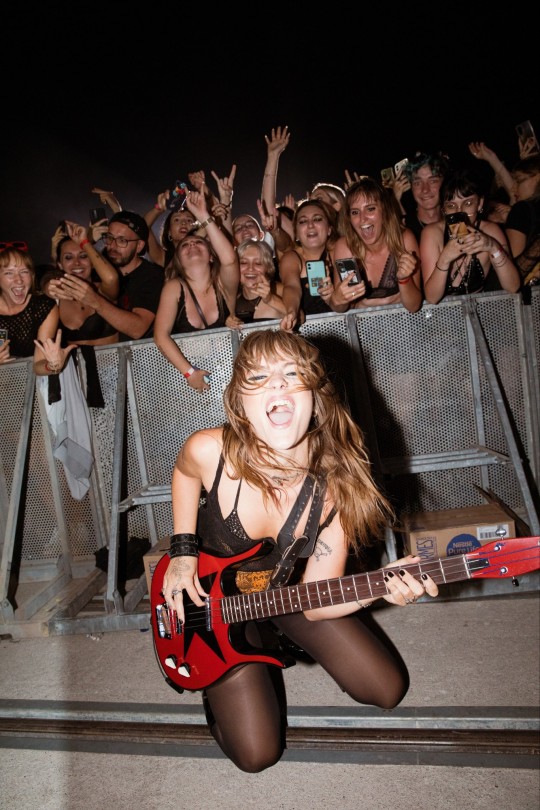


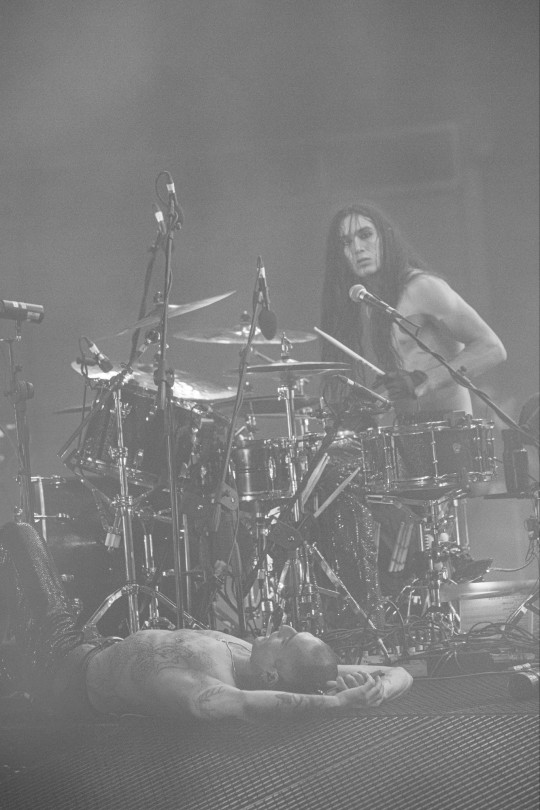
Måneskin HQ on Discord, 07.09.2023
RUSH! WORLD TOUR gig #2 📍Nancy, France
It was super freaking fun on the stage!! 💘
#måneskin#maneskin#ethan torchio#damiano david#victoria de angelis#thomas raggi#vic with her bass 🎸#thomas with his guitar 🎸#ethan drumming 🥁#black & white#edgar & damià#må smiling 😁#with fans#måneskin + sunglasses 🕶️#my posts 💫#september 2023#rush! world tour#france: nancy#nancy open air#discord#i love arm
96 notes
·
View notes
Text
Coraline by Måneskin









Written by the italian rock band Måneskin for their album Teatro d'Ira, this musical-shaped fairytale without a happy ending will surely touch your heart
Coraline tells us about a young, caring and lonely woman who suffers on her own, but still wants to help everyone carry their pain. Hiding her tears and trying to fight her fears and worries in a world who doesn't seem to understand her.
Accompanied by amazing vocals and heavenly guitar beat, Coraline makes the perfect song for when you need to be alone for a while and breath to the music
#Måneskin#rock music#song moodboard#music moodboard#alt rock#rock#rock band#coraline maneskin#damiano david#ethan torchio#victoria de angelis#thomas raggi#maneskin fan#vic de angelis#maneskin songs#maneskin
43 notes
·
View notes
Photo

a little Maneskin Fan art in honor of their new album Rush!I love their music, it has accompanied me for many hours and I can only wish them the best! keep it up guys!
link instagram https://www.instagram.com/aireenscolor/
link da https://www.deviantart.com/aireenscolor
#maneskin#maneskinfanart#digitalart#damianodavid#ethantorchio#victoriadeangelis#thomasraggi#aireenscolor#fanart#måneskin#måneskin fanart#digital art#fan art#måneskinfanart#maneskin fanart#maneskin art#damiano david fanart#thomas raggi fanart#victoria deangelis fanart#ethan torchio fanart#rock band fanart
391 notes
·
View notes
Text
Got to do an Aziraphale version 🔥
#aziracrow#aziraphale#ineffable husbands#ineffable spouses#gomens#good omens#goodomens2#fan edit#maneskin#i wanna be your slave#aziraphale good omens
37 notes
·
View notes
Text
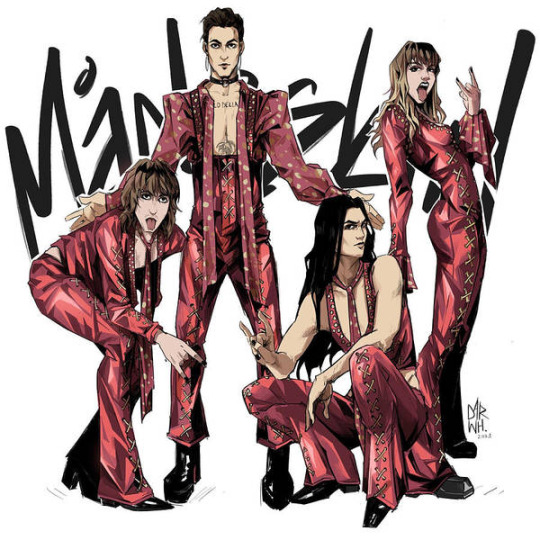
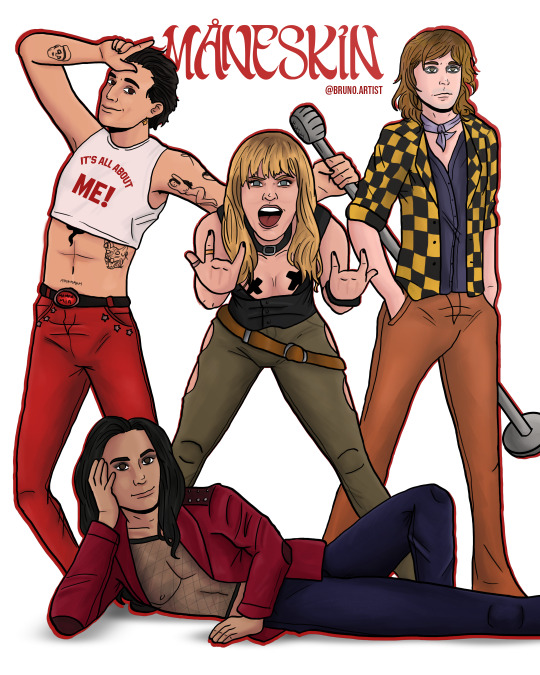



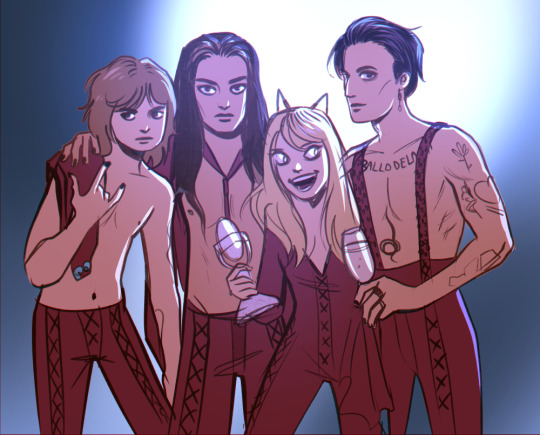

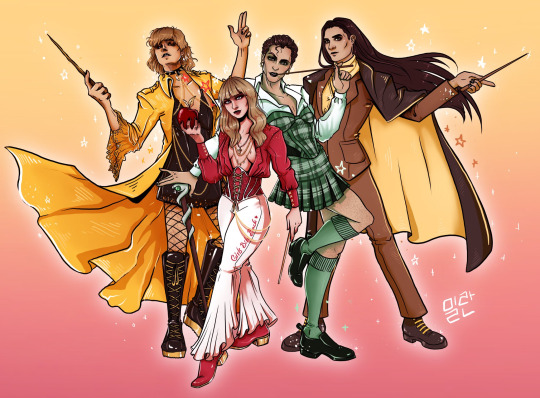
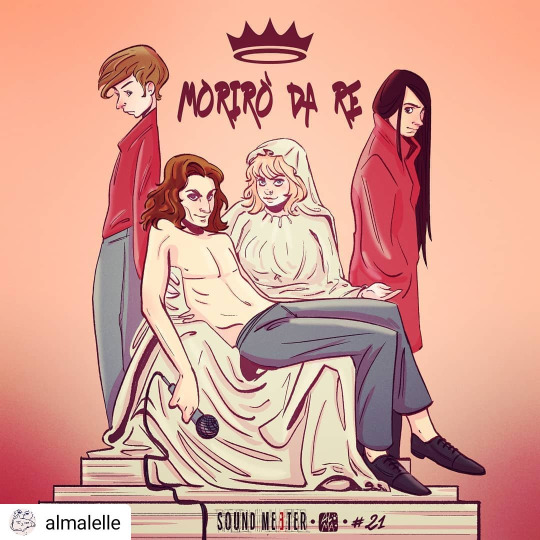
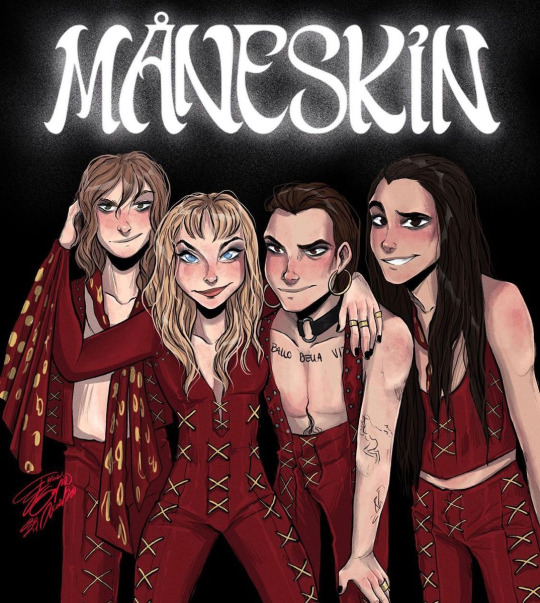
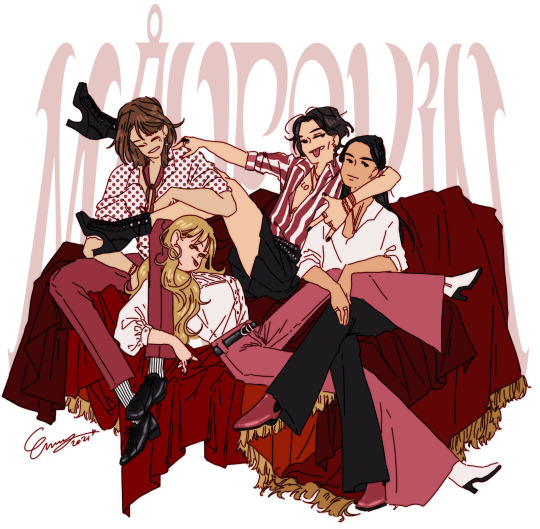
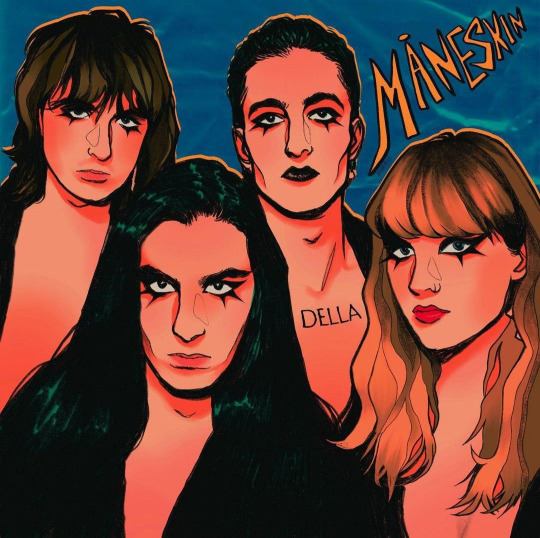
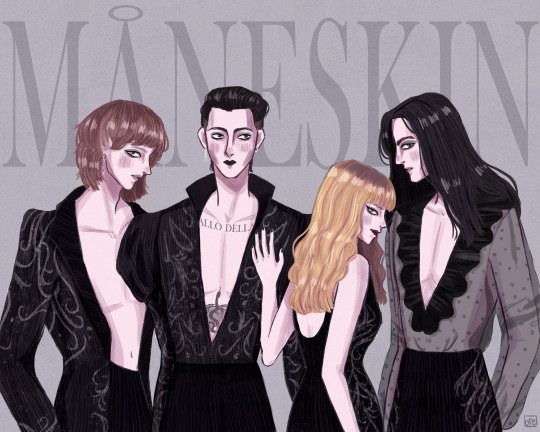

Some of the best fan made art of Maneskin <3
Credits for pictures to:
from lukewarmT3 a_art, Satyriskin, brezzadiluce, cryodraws, estefaniajett (all on twitter). v_ookami, N/Ithilnaur (both on Artstation). brunoartist1581 on deviant art. soyok on Behance. maneskin. xs on pintrest Aurumparadoxum.
56 notes
·
View notes
Note
Omg yaaas prompts are BACK ❤️ may I pls request number 16 "I missed you like I never missed anyone before." it made me think of the meaning of The Loneliest… what if it’s Damiano coming back from the writing session in LA and showing the reader the song
“I missed you like I never missed anyone before.”
Damiano + angst/fluff
There’s a fog over the airport when he arrives. When you hope he arrives. Worse, yet: Even if he does, you have no certainty whether he wants to see you or not. You can’t even being to describe how that’s making you feel.
You watch as the planes take off and land, one after the other, so many people, everyone with their own little stories, going somewhere, going home. You wonder how many have knots in their stomachs similar to yours. How many are on the way to the unknown. Who aren't sure who will greet them when they arrive. How it might change their lives, or not at all.
The arrivals hall is busy, bustling with people, the sound of suitcases being moved over the smooth floor, announcements echoing, mothers crying, children screaming in play or displeasure, lovers kissing, being reunited or torn apart. You wonder which one will be happening to you today.
The arrivals screen changes to “landed” where his flight is listed. Your heart drops, misses a beat, then comes back to life with twice the force. The uncertainty makes you feel like throwing up. You've always been the type to get queasy with anticipation and nerves. Only, you miss the times it would happen with the widest smile on your face and butterflies in your stomach, happily taking all the physical symptoms in the eyes of the excitement of him coming back home to you. Now it was pure anxiety.
The time until the first passengers walk through the doors and into the hall takes an eternity. It leaves you with too much time to think. Nothing else will occupy your time enough not to let your thoughts drift.
A break. You can’t even recall whose deranged idea it was. A fight that escalated in ways it never had before. You didn’t want to get loud and mean and unfair. Neither did he. It wasn’t about him. It wasn’t about you. It was the situation, it was his job, it was your responsibilities keeping you away from him, it was his accusation of not making enough of an effort and yours of not making compromises. It seemed silly the very second the fury had subsided. But the bad taste in your mouth lingered. A break. A chance for both of you to figure out what you want. A three-week trip away from home for him, three weeks of physical pain from the intensity of missing him.
You can’t count how many times you found yourself wondering if he was missing you too. At all. You had no way of knowing. Both of you had agreed to no contact. Take the time to really think things through. Find out if you still wanted each other in your lives and if yes, in which way. Pure torture. You even refrained from contacting the rest of the band, unwilling to bring any of them into your weird, messed-up situation. Only one message had reached you.
Our flight back gets in at 7 pm tomorrow.
You thanked the heavens for Vic. You still aren’t sure if he knows about the text at all, but that’s the least of your current worries. For now, you’re here. For now, you’re waiting for him.
You hate the way the sliding doors keep closing after each passenger, leaving you anxious and impatient for it to open again, just to see another stranger’s face. You still stare at each and every one of them intently, as if you could find him in their features, or gather any knowledge about him at all.
Ethan appears first. He spots you quickly, to your own surprise, since there are multiple people waiting for loved ones and business contacts and you’ve taken to hiding in the crowd. The fear of getting rejected while standing front row for all of these people to see was too humiliating. Ethan gives you a quick wave, puts his sunglasses on, and leaves. You assume he’s looking for their driver. You passed him by earlier but resigned to standing far away from him.
Thomas and Vic walk through the doors at the same time, she’s animatedly talking, hands moving around as much as possible with a heavy-looking bag in tow, he seems tired and not quite in tune with her energy. He spots you too and you can see him change course, direct his feet toward you, but Vic intervenes, a quick look over her shoulder, a soft smile for you, then she pulls Thomas away.
Then he’s there.
Damiano.
The love of your life. The one that left you wondering if you were his too.
He looks rougher thank you’ve ever seen him. And you’ve been there for a lot. He’s wearing a baseball cap and it’s pulled down into his face so much you would have missed him if you hadn’t been looking out for him in particular. You can still make out the dark circles under his eyes, pale skin that looks like he hasn’t been taking care of himself. There’s no energy in his step and he doesn’t look up.
But you need him to see you.
Stepping forward is all it takes. As if drawn in by an innate knowledge of you being around, he looks up, scanning his surroundings for the first time. It only takes a moment before he’s looking straight into your eyes. He doesn’t hesitate as he sets off your way. Your heart is pounding so hard you’re convinced you’re in danger of passing out.
But then he reaches you, his bag dropped and forgotten, and his arms wrap around you so tightly it feels like he’s attempting to make you a part of him. You don’t resist at all, molding against his chest, biting back the tears you don’t want to see on your face in a public setting.
“I-” His voice is hoarse and he immediately stops himself but you assume it’s not just because he sounds off. His eyes flicker away from your face, unable to ignore the people gawking around you. “Not here. Can I- can I take you home?”
You would love to tell him with a kiss. You nod instead.
Your eyes are scanning over the page, struggling to make out any single thought that has been put down on it, and for once it’s not due to Damiano’s handwriting. Your brain is clouded with panic and fear of rejection, you’ll be the saddest part of me, a part of me that will never be mine, words crossed out and re-written, underlined and hasty, the paper slightly crumpled at the edges, it’s torturous. You’re not entirely sure what to make of it, how to sort your thoughts. When you look up at Damiano from your spot on the couch, he’s pacing.
“I couldn’t write about anything but you,” he finally says. “The break… I wasn’t sure if I would see you again. I was completely prepared to have to beg and cry and fall on my knees for you to give me another chance.”
He crouches down in front of you now, holding out his hands to you. You take them immediately as relief floods his eyes.
“And I… I missed you like I never missed anyone before. And this,” he says, only briefly removing his hand from yours to point to a specific passage, “is all I want you to know.”
Cause I don’t even care about the time I’ve got left here The only thing I know now is that I wanna spend it With you, with you, nobody else here
It’s only when you laugh that you realise you’ve started crying. Damiano looks up at you, startled, already wiping away the tears from your cheeks.
“That’s awfully dramatic,” you say with a smile on your face. Your eyes are still watering but the weight has been lifted off your whole body, not just your chest. You feel so light, you’re convinced anything is possible right then and there. Damiano can’t keep the chuckle in either.
It’s not over. There’s a future. He missed you like you missed him. You can do this.
You grab his head into your hands and pull him toward you, finally, finally, putting your lips on his.
“I love you,” you mumble against him.
“I love you,” he replies.
“Good,” you grin, pressing another kiss on his mouth. “Only promise me one thing.”
“No more breaks?” he offers with a laugh.
“Well, that too, but I thought that was a given.”
“Anything you want, amore.”
“Record that song.”
#damiano david imagine#damiano david fanfic#damiano david fluff#maneskin fan fiction#maneskin fiction#maneskin imagine#damiano david blurb#blurb#blurbs#writing#my writing#prompt blurbs
141 notes
·
View notes
Text


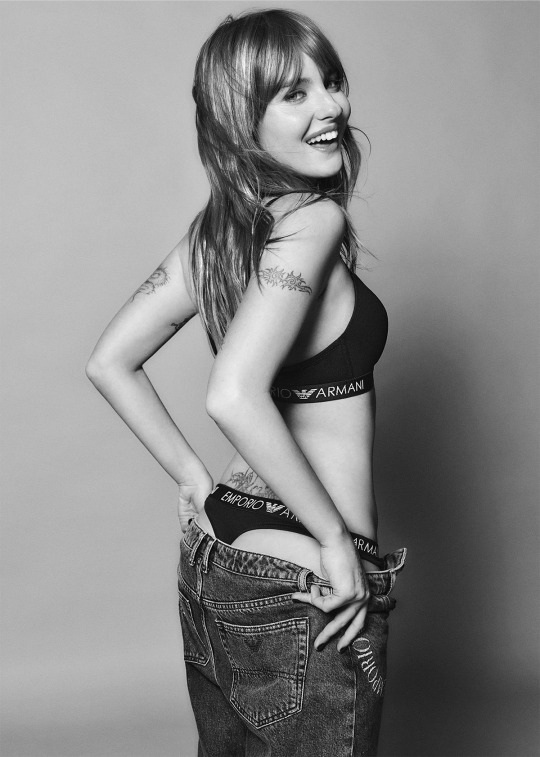

Here comes Victoria De Angelis (bassist for Maneskin - Italy, 2021) posing for Armani Underwear campaign (Spring/Summer 2024)... Sexy af, aight??? 😉💖
📷 & 🎥: emporioarmani (via Instagram)
#eurovision#esc#eurovision fan#eurovision song contest#women of eurovision#victoria de angelis#vic de angelis#maneskin#eurovision star#esc italy#hey sexy lady#sexy content#beautiful#gorgeous
21 notes
·
View notes
Video
youtube
We Are Lady Parts | Zitti E Buoni
found this while scrolling youtube & it truly deserves more love so here you go
13 notes
·
View notes
Text
Solidifying my theory that Damiano is Julian devorak he just needs the eye patch
#the arcana#the arcana game#thearcana#the arcane game#Julian devorak#damiano david#maneskin#damiano maneskin#the hanged man#fan cast
137 notes
·
View notes
Text
ufff dove cameron you dont know with the people you just messed with, better start making an appointment to wash off los gualichos that theyre going to be sending your way lmao
#dove cameron cancelled her lollapalooza argentina concert bc she was supposedly working on her album#but truly she went with her bf the guy from maneskin damianos to italy on a romantic holiday lmaooo#she cancelled after all her fans had boigjt tickets specifically to see her btw and of course they didnt get refunds#otra vez metiendose con latinoamerica los artistas yanquis no aprendieron todavia??
12 notes
·
View notes